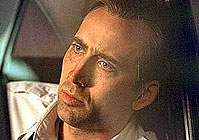|
|
|
|
Bringing
Out the Dead
|
 |
|
Of all the great, contemporary American directors, Martin Scorsese remains the boldest and most experimental. In Bringing Out the Dead, the plot line is pulverised into a string of jagged episodes. Story matters less to Scorsese than sensations, emotions, vivid, split-second perceptions – and this film is a deluge of extraordinary sights and sounds. Frank (Nicolas Cage) is a paramedic working an emergency night shift. Over three nights he rides with different co-workers who represent varying ways of coping with the impossible, unsettling pressures of the job. Larry (John Goodman) attempts, not always successfully, to cultivate a common-sense, good humour. Marcus (Ving Rhames) channels his manic energy into religious fervour. Walls (Tom Sizemore) has become a violent, bullying psychotic. Despite the gritty realism of the detail, all the incidents in this film have a surreal, spooky, disorienting, profoundly disturbing character. It is as if Scorsese has set out to evoke for us a strange, floating, transitional state between this life and the next. Near-death experiences (some drug-induced) jostle with heartbreaking images of new life – as in the remarkable scene where Frank barrels down the hospital corridor with a tiny, dying baby in his arms. Scorsese brings out this heightened, expressionistic level of his material most blatantly – and least successfully – by introducing the ghost-like figure of a woman Frank once failed to save. Her face, rather cornily, now haunts him everywhere he looks. One needs instead to concentrate on the brilliant, fine touches of Scorsese's style – rapid editing, blurry images, confusion of sound, intensity of light and colour – to really absorb the mood and meaning of the piece. Bringing Out the Dead revisits, on many levels, the setting and themes of Taxi Driver (1976). New York is again a nocturnal, Dantean vision of Hell itself. As in many of his films, Scorsese gives us a hero at an extreme point of suffering, moral confusion and hyper-stimulation, given to suicidal fantasies. Once again, there is an apparently angelic woman, Mary (Patricia Arquette), who may save the hero – but she, too, is lost in the miasma of the modern world. Like Michael Mann, Scorsese reserves the right to explore ideas of sin, redemption, resurrection and the 'hero's journey' – no matter how debased and formulaic these devices have become within popular film. There is room to wonder, however, if Scorsese has been able to give genuine depth to his favourite Christian allegory this time around. Frank is not as engaging a character as Travis in Taxi Driver or Jake in Raging Bull (1980). We get little sense of Frank's past, or his interactions with anyone outside the job. This must be a deliberate choice by Scorsese: like Romance (1999), this film gives us a hero who is purely 'in the present moment', abstracted from conventional coordinates of characterisation. Frank's wild voyage is certainly compelling. But the most difficult moment for Scorsese as an artist has always been when he must finally detach himself from the first-person consciousness of his hero figures, and integrate them into the real world. Scorsese is uncomfortable with anything but a solipsistic, driven, hallucinating individual. There has scarcely been a single relationship, marriage, friendship, family, tribe or community in his work that has not gone up in the flames of savage self-destruction. When he tries to affirm a vital gesture of human connection, as here, the tone is often weak or ambiguous. It is even hard to decipher the supposed moment of redemption in Bringing Out the Dead. The entire film hinges on the figure of Mary's father, who lies in hospital hovering between life and death. Frank's God-like, ego-driven fantasy has hitherto been that he can save people, bring them back to earth. Faced with this man, he ponders a different option. But is his reasoning any less addled, self-aggrandising or amoral than it has been throughout the story? Stepping down from the lofty heights of life-and-death allegory, it is possible to read Bringing Out the Dead in more mundane terms. This is a film about, as Cy (Cliff Curtis) puts it, "stressful occupations" – like being a paramedic, a drug dealer or a filmmaker. Beds are everywhere in the film, but mostly as places where people die in an abrupt, humiliating fashion, or scream their lungs out. The true ideal of heaven, in such a world, is a decent, restful, uninterrupted sleep. Scorsese, as always, makes grand cinema from this simplest and yet most necessary of pleasures. MORE Scorsese: The Age of Innocence, The Aviator, The Blues, Cape Fear, Goodfellas, The King of Comedy, Kundun, Rolling Thunder Revue, Casino, The Irishman, After Hours, The Last Temptation of Christ © Adrian Martin April 2000 |
![]()